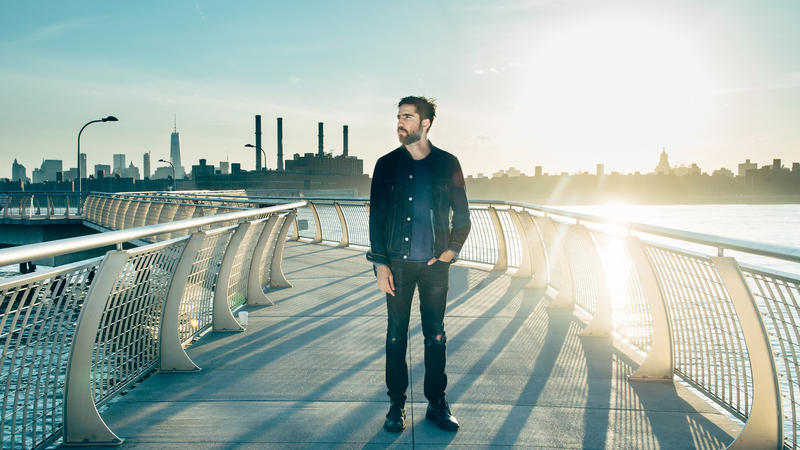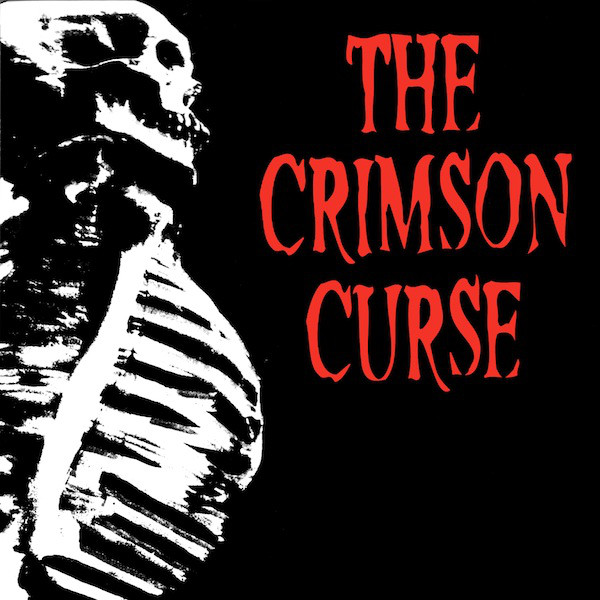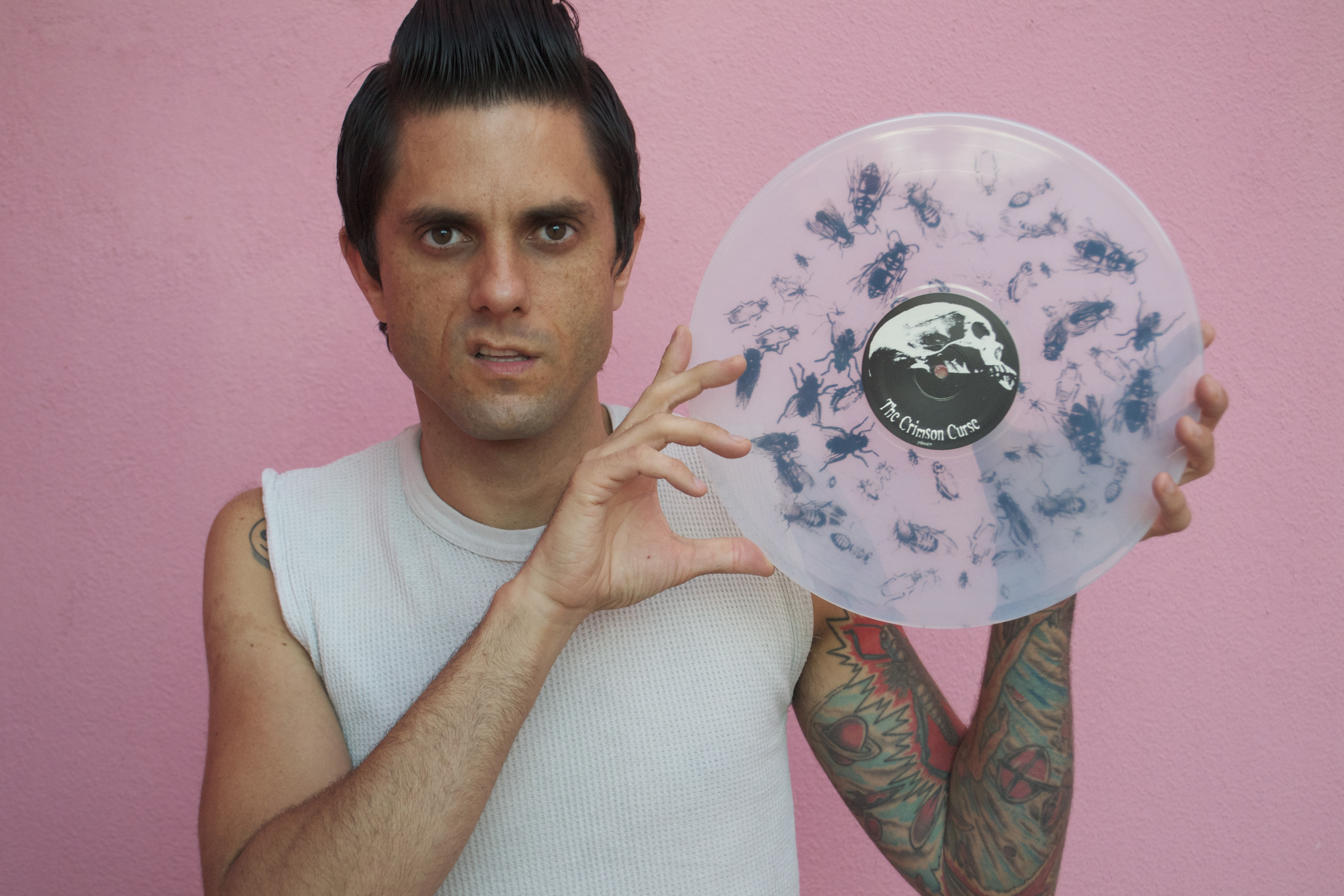Justin Pearson interviews Jimmy Lavalle about The Crimson Curse
“I Hung Around In Your Soundtrack” Part 12 by Justin Pearson
The Crimson Curse “Both Feet In The Grave” LP
Nobody in The Crimson Curse knew what we were doing at the time of the band. We had so many strange ideas, which all amounted to a brief stint in time. I’m not sure why, but initially we started the band, wrote the material for our first record, and were really set on getting a straight edge record label to release it, all in the matter of a couple months. However, no SXE labels were “cutting edge” enough to take a liking to us, so we somehow talked our friend Mark Waters to release it, who at the time ran Goldenrod, a local San Diego label. We were certainly an odd band for the label’s primarily indie rock roster, but Mark was and is one of the raddest people I’ve ever met, and for some reason he had so much enthusiasm towards our band and towards releasing our album. For the most part, we were use to having nothing, no support, no help, and Mark seemed to have it all: a van that he drove us to shows in, he let us do whatever we wanted as far as packaging, and even got us free skateboards.
We opted for the silk-screened one-sided clear vinyl thing, threw an image of a bunch of insects on it, and had a screening party at the house that is now known as “Locust House,” due to Adam Gnade’s book. Mark had us recruit a few friends to help print, he showed up with a ton of pizza, and in no time every flat surface of the house was covered in creepy insect silk-screened records. As much as we wanted to have a really really bad attitude, we just really wanted to mess with people and try to push people’s buttons.
Initially we set out as this pseudo-Misfits type band, but that eventually morphed into an all out absurd-whatever-goes-that-is-sketchy type vibe, which usually resulted in a bunch of people, including band members, being completely naked at shows. Not to mention the crowd started to show up in various costumes, mostly in drag. Somehow none of us in the band died, we managed to play a handful of shows in a few states, and then we called it quits for reasons unknown. Shortly after the band stopped, Goldenrod also stopped, so Three One G took the opportunity to repress the album with slightly different artwork and packaging, along with silk-screen variations and colors for the vinyl. What a strange bunch of people we were. I wish the band had still gone on.

Interview with Jimmy LaValle: January 2018
Justin Pearson: The start of the band seems odd in retrospect. I think we had put a lot of effort into our other projects, such as The Locust- before and after you joined- as well as with Guyver 1. Then, there was this sort of weird backlash with the punk community that we were all from. Specifically with what seemed to be the overtly conservative Heartattack publication, which seemed to steer a lot of people in certain directions as to what was acceptable and what was not. There was a lot of criticism of bands such as Antioch Arrow, which we all really liked, so there was this air of “fuck you” when we started The Crimson Curse. It was in some sort of solidarity with them, against how everything was seeming to be pushed in a certain direction. I suppose the sort of Misfits or Cramps-esque vibe that we had applied to hardcore, coupled with us trying to do everything “wrong” (such as trying to talk Revelation records into releasing out first album), was in the same spirit. Did you see the band as an intentional bad attitude?
Jimmy LaValle: I remember us having more of a fuck it attitude. If that was considered a bad attitude, then yeah, we had a bad attitude because we really did say fuck it to everything. I don’t have the clearest memory of the Heartattack camp, but I remember a ton of jock, meathead, bro culture that somehow paralleled with the straight edge hardcore scene that we wanted to say fuck you to. I tend to remember that’s why we wanted to paint our faces, play in costume, or almost naked, or totally naked– to make “bros” feel uncomfortable. Musically, i wanted to do something that was different than all the other bands I looked up to in my early years (I was 18 when we started the Curse). I wanted to borrow from all these bands and add a “haunting punk” twist to it all. Adding scary keyboard drones, playing in minor scales, etc. All to add to the aesthetic of doing something different then all of our other bands.
JP: There was this sense of hostility from a lot of people who were going to shows at that point. It was odd, and seemed counter productive. I suppose my “bad attitude” reference was a bit of a tongue in cheek comment. There was that machismo aspect as well as this air of seriousness that was a bit of a bummer at times. For me specifically, you, Mike Cooper, and Christopher Sprague, who are all hilarious people, and genuine pranksters, helped put us in that mindset. Perhaps we were a breath of fresh air to some, especially at an event like the More Than Music Fest that we played. I just remember looking out at the crowd and seeing so many completely naked people, dudes in lingerie, and just ridiculous makeshift costumes. It was a full-on freak show only at that point in the fest’s line up. And still there was even hostility to everyone who was enjoying themselves at that fest while we played. In retrospect, we seemed to teeter on the fine line of trying to pull pranks and confuse people, and just upsetting people. In specific, when you and I went to Tijuana to get half sticks of dynamite to threaten the straight edge gang that kept trying to beat us up in Orange County. Anyhow, I wonder what percentage of our antics tied into the actual music and what we were actually trying to create on just a musical level. I think before we were playing in The Crimson Curse, we were heavily influenced by more righteous serious type bands like Crossed Out and Los Crudos. But with The Crimson Curse, we really went back a bit further and were consciously and even subconsciously drawing influence from the less serious and more theatrical bands of the past, such as the Dead Boys and The Cramps. Did you see this shift in our musical culture, or in retrospect now, see it back then, and do you think it made any sort of impact on stuff that followed after The Crimson Curse stopped being a band?
JL: Oh man!! The memories… walking through the customs with M100’s stashed in our socks and underwear… those were the days. But also for the reason of trying to freak out the straight edge kids that really wanted to beat us up. They hated us. I remember that time in Corona? Claremont? Somewhere? Can’t remember the specific city, but I do remember the event of thinking we were about to be jumped by a crew of straight edge bros, and then us all acting crazy, maybe we also all started making out with each other to freak ‘em out too? Anyhow! Yeah. It was super cool that we brought out a sense of theatrics within the audience. Kids with sparklers during one of our shows at the Che, dudes in lingerie and people naked as you mentioned. I think that was great. And at the same time, exposed the bad people in a scene that was definitely supposed to be the most accepting of all walks / freaks of life. I also wanted to do something different that was a little more raw and more musical than Crossed Out & Rorshach, and that’s where we all clicked. We had the raw, discordant moments that fell into pretty memorable guitar parts. I remember that writing the songs came easy. Cooper had Goldfish (might’ve been our first song?) and I think Christopher and I (while living together) wrote the first LP in a couple days. I remember lyrics and vocals came fairly quick and easy for you, too. It all worked, we were on the same page, and we all wanted to have fun while also bringing out the prankster in all of us to the band. I can comfortably say that we influenced some bands after us, but I don’t know that any other band ever experienced the same kind of… audience participation, if you will, that we did in those days. I mean, I’m sure others have, but those were our moments and it was fun as fuck.
JP: It’s so crazy to look back and see that not only we were trying to make music, but we were also in some sort of constant combat with people, and it was an array of them. I think this element certainly resonated with The Locust, when you were playing in that band as well. Unfortunately for some, they completely missed the musical aspect and just focused on the garbage aspects of the stuff we were doing. Perhaps it was a thing of that time, as it seems that you and I don’t really deal with that stuff anymore, thankfully. I get it though, a lot of what we were raised on, and drew influence from, led us to being reactionary. Perhaps we didn’t have a conscious choice in the matter. Anyhow, let’s talk about the song writing… You and Christopher seemed to have this really innovative way of writing, specifically with the sound you achieved together. I know you touched on the technique you both had, but I think the timbre that was the sound of the Crimson Curse was this mix of rhythm and unsettling sound and tone. Do you feel it was jarring and perhaps uneasy to hear in context of musical theory for people who understand what is “right and wrong” with songwriting? Specifically in context to the more general, now recognized genre “noise rock,” or something along those critical lines, there was still this strange sense of melody, harmony, and over all tones that were in fact musical. You know, it was abrasive, it was supposed to be. But it wasn’t just uneducated noise for the sake of creating noise. Was this calculated at the time, or just created by chance?
JL: The funny thing is the memories I have of us playing live are that we just sounded like noise. But looking back at videos, I now know that’s not the case. Musically though, Christopher and I definitely had a formula. We used three main guitar fingerings. An octave with a flat 5th, a two note bend on the G/B strings to create a dissonant sound at first before quickly bending them into unison, then lastly just straight octaves. Those three things were “our” sound. You can hear it well in Radiation Blue. The intro is the octave/flat 5th into octaves and the “chorus” is the octave/flat 5th with the two note bends over me screaming “she’s dead.” Obviously, Christopher and I were both melodic players, having gone onto form Tristeza, an instrumental melodic guitar band, and me into Album Leaf. Before the Crimson Curse, Christopher did Constantine Sankhati which was also pretty melodic.. So I think that really came through in our songwriting from the beginning. But I was never sure if it came across live. One of my best memories was actually seeing a Swing Kids show and remembering being able to hear everything. You were a punk band but it was melodic. Before forming Crimson Curse, I was playing in Guyver 1 and the Locust, with you, and I felt like both of those bands weren’t very clear live so I really wanted to make sure we sounded musical while still being an abrasive punk band.
JP: This is really interesting to me when looking back in retrospect. You are correct about the melody of other bands. I was never really aware of what I could achieve, on my own end, when playing bass. I think a lot of my personal goals were to achieve things with tone when playing bass in other bands, aside from The Crimson Curse. Later on, after we stopped writing music together, I discovered effects pedals and went a bit crazy with that stuff. But with you and Christopher, you are right, it was this really strange feeling created with sound, which I thought was so amazing. It really changed my subconscious view of avoiding melody, since before that point, melody seemed soft, or nice, or sad. The stuff you guys were doing seemed uneasy, annoying, and still held onto some really good elements of melody, but still seemed scary. Now I just wish I knew what I know now back then with my contribution to the band. I was a crummy vocalist, and mediocre lyricist. It’s too bad we don’t have those tapes so I could just go back and redo my parts. Nonetheless, as a band we somewhat seemed to be covering new ground. Even with Mike Cooper’s drumming as well, and also adding a synth in the mix too. Some of the beats were a bit more creative, than what a lot of punk and hardcore bands were willing to do. I assume a lot of that was due to our diverse influences, but possibly also due to the fact that we were in San Diego and open to incorporating stuff that most bands in certain genres weren’t influenced by. I’m certainly grateful that I was able to work with you all in that band, as it helped steer me in a direction or directions that have brought me to where I’m at today. Not only that, but you and Christopher are some of the raddest people I’ve ever worked with. I suppose we all are pretty lucky to have been able to pull off what we did and see how it transpired in The Crimson Curse and beyond.
JL: I think adding keyboards to our sound was key. An instrument that remained solid, in tune etc. And utilizing drones from it, like guitar feedback would, was also something unique to hardcore at that time. I think whenever the VSS would come play a house show, or where ever we’d all do shows, watching how Andy used his Juno and how melodic they could be in songs like Lunar Weight really blew my mind. Definitely was a big inspiration there and broke down the barrier of melody seeming soft, or nice or sad. Their were other bands that were melodic in that time, but none that really had the abrasiveness or even hardcore punk approach that were melodic like the VSS. At least that’s my memory. I really loved your vocals, I thought changing your approach to a more “snotty, smart ass” delivery was key to our aesthetic. And Coopers drumming was way more creative at the time than most bands’ drummers, and he was only 15!! Which was insane. Damien came from a total goth/industrial background and played a 5 string bass!!! That shit is off limits now hahaa! I still can’t believe he played it. We all had extremely diverse taste, but all connected with this band. Of all the bands we did together, or yours that I was a part of, the Curse was definitely my favorite. Maybe because we started it together, but I’m really proud of the records we made. We were all so young and that’s just nuts when you look back at it.
JP: It is pretty crazy how it all solidified, and how things worked, even though it was for such a short amount of time. I’m just glad that we didn’t die on tour when breaking down in the middle of nowhere, or getting shot by cops when those kids at a house show stole the cop car and drove it off the road so we could still play our set. It’s really amazing that we are all still here, after all the odds this world gave us.

